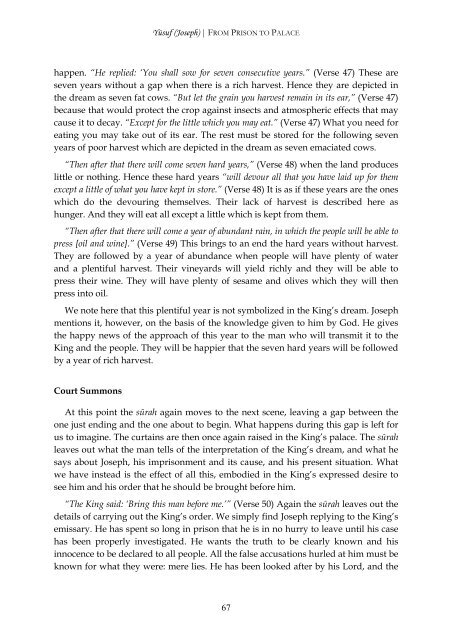Volume 10 Surah 12 - 15 - Enjoy Islam
Volume 10 Surah 12 - 15 - Enjoy Islam
Volume 10 Surah 12 - 15 - Enjoy Islam
Create successful ePaper yourself
Turn your PDF publications into a flip-book with our unique Google optimized e-Paper software.
Yūsuf (Joseph) | FROM PRISON TO PALACE<br />
happen. “He replied: ‘You shall sow for seven consecutive years.” (Verse 47) These are<br />
seven years without a gap when there is a rich harvest. Hence they are depicted in<br />
the dream as seven fat cows. “But let the grain you harvest remain in its ear,” (Verse 47)<br />
because that would protect the crop against insects and atmospheric effects that may<br />
cause it to decay. “Except for the little which you may eat.” (Verse 47) What you need for<br />
eating you may take out of its ear. The rest must be stored for the following seven<br />
years of poor harvest which are depicted in the dream as seven emaciated cows.<br />
“Then after that there will come seven hard years,” (Verse 48) when the land produces<br />
little or nothing. Hence these hard years “will devour all that you have laid up for them<br />
except a little of what you have kept in store.” (Verse 48) It is as if these years are the ones<br />
which do the devouring themselves. Their lack of harvest is described here as<br />
hunger. And they will eat all except a little which is kept from them.<br />
“Then after that there will come a year of abundant rain, in which the people will be able to<br />
press [oil and wine].” (Verse 49) This brings to an end the hard years without harvest.<br />
They are followed by a year of abundance when people will have plenty of water<br />
and a plentiful harvest. Their vineyards will yield richly and they will be able to<br />
press their wine. They will have plenty of sesame and olives which they will then<br />
press into oil.<br />
We note here that this plentiful year is not symbolized in the King’s dream. Joseph<br />
mentions it, however, on the basis of the knowledge given to him by God. He gives<br />
the happy news of the approach of this year to the man who will transmit it to the<br />
King and the people. They will be happier that the seven hard years will be followed<br />
by a year of rich harvest.<br />
Court Summons<br />
At this point the sūrah again moves to the next scene, leaving a gap between the<br />
one just ending and the one about to begin. What happens during this gap is left for<br />
us to imagine. The curtains are then once again raised in the King’s palace. The sūrah<br />
leaves out what the man tells of the interpretation of the King’s dream, and what he<br />
says about Joseph, his imprisonment and its cause, and his present situation. What<br />
we have instead is the effect of all this, embodied in the King’s expressed desire to<br />
see him and his order that he should be brought before him.<br />
“The King said: ‘Bring this man before me.’” (Verse 50) Again the sūrah leaves out the<br />
details of carrying out the King’s order. We simply find Joseph replying to the King’s<br />
emissary. He has spent so long in prison that he is in no hurry to leave until his case<br />
has been properly investigated. He wants the truth to be clearly known and his<br />
innocence to be declared to all people. All the false accusations hurled at him must be<br />
known for what they were: mere lies. He has been looked after by his Lord, and the<br />
67

















